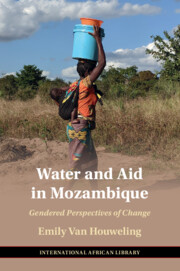
- Publisher:
- Cambridge University Press
- Online publication date:
- August 2022
- Print publication year:
- 2022
- Online ISBN:
- 9781009193474
- Series:
- The International African Library (68)

Analysing how water development projects unfolded in five rural communities in Mozambique, Emily Van Houweling offers an alternative perspective on water and the politicised nature of water management in the region. Using a hydro-social cycle framework, she demonstrates how water is tied to everyday life in matrilineal Nampula and how social relations, gender roles, and local politics were reconfigured during the project. While centring the experience of community members, Van Houweling also includes the perspectives of project implementers, showing how project plans were translated and negotiated as they worked their way down to the community. Employing the concept of organisational culture, Van Houweling reveals the tensions that resulted from different actors' decision-making processes and motivations, and illuminates possible explanations for the gaps between policy and practice. Exploring women's empowerment, community ownership, and participation, this book facilitates innovative ways for thinking about evaluation, sustainability, and gender-water relations.
‘Yet more evidence that the aid industry seems unable to listen to local people - the supposed ‘beneficiaries’ - and instead imposes simplistic technical and economic solutions and repeats decades-old mistakes. This book shows that not only have donors and lenders not learned, but they are going backwards.’
Joseph Hanlon - The Open University
‘This richly documented and powerfully argued book demonstrates the centrality of water in the lived experiences of peasants in Northern Mozambique. This outstanding study will not only be of interest to Africanists but to students and scholars interested in issues of water and society, sustainable development, and women’s struggles over scarce resources.’
Allen Isaacman - University of Minnesota
‘A brilliant, well-grounded revelation of the realities of international development aid policy and implementation from the perspectives of the ‘beneficiaries’: women customary water managers of the matrilineal Makhuwa ‘participating’ in a large handpumps project. A highly accessible story of interwoven vivid descriptions of local encounters, critical theory, and personal reflection.’
Barbara van Koppen - International Water Management Institute
 Loading metrics...
Loading metrics...
* Views captured on Cambridge Core between #date#. This data will be updated every 24 hours.
Usage data cannot currently be displayed.